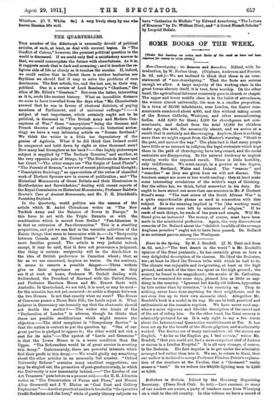Sinai in the Spring. By M. J. Rendell. (J. M.
Dent and Sons. 4s. 6d. net.)—" The best desert in the world" is Mr. Rendell's opinion of the Sinai peninsula ; he has certainly given us here a very delightful description of its charms. He liked the Bedouins, too ; at least he liked the Towara tribe with which ho had to do. The climate was enjoyable and invigorating, at least on tho high ground, and much of the time was spent on the high ground ; the scenery he found to be magnificent ; the monks of St. Catherine, where he remained for some days, pleased him as little as any- thing in the country. "Ignorant but kindly old fellows, hypocrites by fate rather than by intention," is his summing up. They do nothing, never have done anything for their neighbours, and do not even live up to their own monastic ideal. Altogether Mr. Rendell's book is a model in its way. Ho can be both practical and enthusiastic as the occasion requires. We have never read any- where a more vigorous and life-like description of the camel and of the art of riding him. On the other hand, the Sinai scenery is admirably pictured for us. It is only right to say a few words about the International Quarantine establishment at Tor. It has been set up for the benefit of the Mecca pilgrims, and is admirably worked. The doctors are of many nationalities ; all the sisters are English. "As far as the English go, I feel certain," writes Mr. Benda, "that you could not find a more competent staff of doctors or nurses in a London Hospital." It is all very strange, of course, to the Bedouin. His first impulse is to get under the admirably arranged bed rather than into it. We see, to return to Sinai, that our author is inclined to accept Professor Flinders Petrie's explana- tion of the numbers at the Exodus, that a "thousand" really means a "tent." So we reduce the 600,000 fighting men to 5,000 or 6,000.


























































 Previous page
Previous page